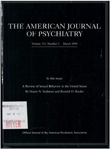From nurture to network: examining links between perceptions of parenting received in childhood and social bonds in adulthood
Abstract
OBJECTIVE: The authors' goal was to consider the extent to which key characteristics of their parents influence children's later socialization in terms of social networks and intimate relationships and thus to examine whether there is evidence of such continuity. DATA COLLECTION: The authors reviewed the pertinent literature and then examined studies using a measure of key dimensions of the parenting received in childhood (the Parental Bonding Instrument) as well as measures of adult social networks. FINDINGS: The literature review revealed evidence of links (more evident in women) between perceptions of having received uncaring parenting and deficiencies in diffuse social bonds, which could reflect a causal process, a general response bias, or methodological limitations. By contrast, studies using the Parental Bonding Instrument and a specific measure of adult intimate bonds failed to find links between perceptions of parenting received in childhood and the quality of current intimate relationships unless there was extreme deprivation of parental care; in that case, the current intimate relationship was more likely to be rated as uncaring. CONCLUSIONS: These findings refine the view that early socialization experiences shape and dictate interpersonal relationships in adulthood. Any deficiencies in parent-child relationships, except, perhaps, gross parental deprivation, appear capable of modification by a range of experiences (particularly subsequent interpersonal relationships).
Access content
To read the fulltext, please use one of the options below to sign in or purchase access.- Personal login
- Institutional Login
- Sign in via OpenAthens
- Register for access
-
Please login/register if you wish to pair your device and check access availability.
Not a subscriber?
PsychiatryOnline subscription options offer access to the DSM-5 library, books, journals, CME, and patient resources. This all-in-one virtual library provides psychiatrists and mental health professionals with key resources for diagnosis, treatment, research, and professional development.
Need more help? PsychiatryOnline Customer Service may be reached by emailing [email protected] or by calling 800-368-5777 (in the U.S.) or 703-907-7322 (outside the U.S.).



